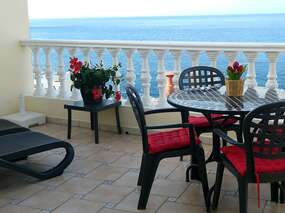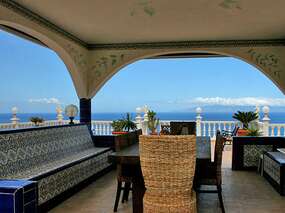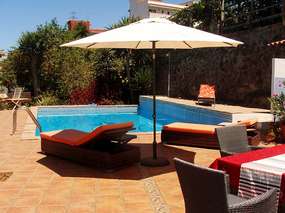Spanish for beginner's - a Spanish class for your trip
Yo no hablo español
Learn Spanish
We wrote down the basic knowledge and some important words and sentences, so you can prepare yourself for your holidays on Tenerife. Learn some of the vocabulary and sentences and the holiday feeling on a Spanish Island starts at home. We also wrote down some idioms and sayings.
Let’s get started!
First off you will learn how to say hello and goodbye:
Hola y adiós:
¡Bienvenidos! - welcome!
¡Buenos días! - good morning!
¡Buenas tardes! - good afternoon!
¡Buenas noches! - Good night!
¡Hola! - Hello!
¡Dígame! - This is how to answer the phone. It actually means: talk to me.
¿Cómo estás? - How are you?
¿Cómo está (usted)? - The polite saying for how are you? (formal; to show respect)
Estoy bien, gracias. - I'm fine, thank you.
¡Adiós! - Bye!
¡Hasta luego! - See you!
¡Hasta mañana! - See you tomorrow!
¡Hasta pronto! - See you soon!
¡Nos vemos luego! - See you later!
¡Hasta la próxima! - See you next time!
¡Que tengas un buen día! - I wish you a great day!
¡Que lo pases bien! - Have fun!
You want to thank someone? Say:
¡Gracias! - Thanks; Thank you!
¡Muchas gracias! - Thanks a lot; thank you so much!
¡Muchas gracias por su hospitalidad! - Thank you for having us!
Probably you will here:
¡Por favor! - Please!
¡De nada! - You're welcome!
Tell something about you!
What's your name? Where are you from? When did you got born?
Me llamo … - My name is ...
Soy de ... - I'm from (country)...
Vengo de … - I'm from (I live in)...
Tengo 30 años. - I'm 30 years old.
Soy alemána. - I'm inglés (female).
Soy alemán. - I'm inglesa (male).
Soy español. - I'm Spaniard.
Nací en 1986 - I got born in 1986.
Vivo en Santa Cruz de Tenerife. - I live in Santa Cruz de Tenerife.
Mi cumpleaños es el 9 de abril. - My birthday is at the 9. April.
You have a question? – Use the Spanish question words:
¿Cómo? - how?
¿Quién? - Who?
¿Por qué? - Why?
¿Qué? - What?
¿Dónde? - Where?
¿Cuándo? - When ?
¿Cuánto? - How much?
¿Hay...? - There is/are?
¿Tienes...? - Do you have... ?
You want to answer, you could say e.g.:
Sí - Yes
No – No
No sé. - I don't know.
No lo sé. - I don't know that.
Creo ... - I think...
No entiendo. - I don't understand.
No hablo mucho español. - I don't speak much Spanish. (I don't speak Spanish very well)
¿Usted podría escribirlo? - Could you write it down for me?
Depende ... - That depends (on) ...
No lo creo. - I don't think so.
Supongo que sí. - I suppose/assume (it could be).
No pasa nada. - That's ok / Don't worry/ Never mind.
Me da igual. - I don't mind/ care.
If you didn't understand or just understood a bit, you can ask them to talk slower or to repeat what they said:
¿Podría hablar más despacio, por favor? - Could you please talk a bit slower?
¿Uste podría repetirlo, por favor? - Could you please repeat it.
You want to go shopping?
When you are in a store you might get asked the following:
¿Ya le atienden? - Do you get served already?
¿Le puedo ayudar? - Can I help you?
You could answer:
Quisiera … - I would like / I want …
¿Cuánto cuesta? - How much does it cost?
You have everything you need? Say:
Es todo. - That's all.
At the checkout you might get asked:
¿Con dinero o con tarjeta? - By cash or by card?
You are surprised about the price:
¡Esto es caro! - That is expensive!
Here you will find some vocabulary to go shopping.
De compras y dinero - Shopping and money:
comprar - (grocery) shopping
ir de compras - to go (grocery) shopping
la oferta - the offer
barato – cheap
gratuito - for free
agotado - sold out
la caja - the checkout
Son 6 euros con 30. - That costs 6,30 Euro.
Me gusta. - I like it.
el dinero - the money
el dinero suelto - coints
el sueldo - the salary
el banco - the bank
sacar dinero - to withdrawal money
el importe - the amount
el pago - the payment
What do you want to buy and where do you want to shopping? Do you need food?
La lista de la compra - write a shopping list
Maybe you need the following things:
el pan - the bread
el panecillo - bread roll
la sal - the salt
la pimienta - the pepper
el aceite - the oil
los fiambres - the lunchmeat / cold cuts
el jamón - the bacon
el pescado - the fish
el salmón - the salmon
la trucha - the trout
el atún - the tuna
la carne - the meat
el bistec - the steak
la carne picada - the mincemeat
la carne de ave - the poultry
la pechuga de pollo - the chicken breast
la patata - the potato
el ajo - the garlic
la cebolla - the onion
el pimiento - the peper
el tomate - the tomato
el pepino - the cucumber
la fruta - the fruit
la naranja - the orange
la manzana - the apple
el plátano - the banana
la pera - the pear
la fresa - the strawberry
el café - the coffee
el té - the tee
la cerveza – the bier
el vino tinto - the red vine
Or would you like to go out for lunch/dinner
In the restaurant
When you go out in a restaurant you might get asked the following:
¿Desearía comer algo? - Would you like to eat something?
¿Qué le traigo (para comer)? - What would you like to eat?
You can't decide? Ask for the menu and for a recommendation:
¿Me puede traer el menu? - Could you bring me the menu?
¿Le puedo recomendar algo? - What can you recommend?
For sure they will ask you if you want to drink something and what:
¿Usted quiere tomar algo? - Would you like to drink something?
¿Qué le traigo (para beber)? What do you want to drink?
Ask what kind of drinks they have:
¿Qué bebidas tienen? -What drinks do you have?
Did you like it? Now it's time to pay:
¿Me traen la cuenta, por favor? - Can you please bring me the bill?
¿El Servicio está incluido? - Is the tip included?
Good to know:
The days of the week:
la semana - the week
lunes - Monday
martes - Tuesday
miércoles - Wednesday
jueves - Thursday
viernes - Friday
sábado - Saturday
domingo - Sunday
The month
enero - January
febrero - February
marzo - March
abril - April
mayo - May
junio - June
julio - July
agosto - August
septiembre - September
octubre - October
noviembre - November
diciembre - December
Times
ayer - yesterday
hoy - today
mañana - tomorrow
Numbers from 1 – 10
0 - cero
1 - uno / una
2 - dos
3 - tres
4 - cuatro
5 - cinco
6 - seis
7 - siete
8 - ocho
9 - nueve
10 - diez
The ordinal numbers (1. to 10.)
1st. - primero
2nd. - segundo
3rd. - tercero
4th. - cuarto
5th. - quinto
6th. - sexto
7th. - séptimo
8th. - octavo
9th. - noveno
10th. - décimo
Learn the correct pronunciation
Some of the Spanish letter sounds like the English letters, but not all and not always:
- C - this letter sounds different, depending of the following vowel. It can sound like a k or like a th.
If the C is in front of an "a,o,u" it sounds like k (can - cantar) - if it's in front of an "i or e" it sounds like th (thinking- cincuenta). - CH sounds like tsch (Chica).
- G in front of "a,o,u" sounds like g (good). In front of "e or i" it sounds like ch (Spanish Juan).
- H does not get pronunced nicht.
- J sounds like ch "Juan”.
- LL sounds like j (jupiter).
- Ñ sounds like nj.
- QU sounds like k (kangaroo).
- R gets rolled onces (car).
- RR gets rolled many times (brrrrrr).
- V sounds like a mix between b and w.
- Z sounds like th.
In the end of our little language class we wrote down a few sayings - maybe you know some of them:
- Caballo regalado no se le mira el diente.
Don't look a gift horse in the mouth. - Más vale tarde que nunca.
Better late than never. - Cría cuervos y te sacarán los ojos.
No good deed goes unpunished. - Al mal tiempo, buena cara.
To grin and bear it. - El que madruga coge agua clara.
The early bird gets the worm. - No hay mal que por bien no venga.
Everything bad also has it good sides.
More information about - language trip Tenerife - when learning becomes a holiday

- South Los Gigantes / Puerto Santiago
- 4 Guests / ca. 100 m²

- South Los Gigantes / Puerto Santiago
- 3 Guests / ca. 70 m²

- South Granadilla / El Salto & Umland
- 3 Guests / ca. 52 m²

- North La Matanza
- 3 Guests / ca. 70 m²

